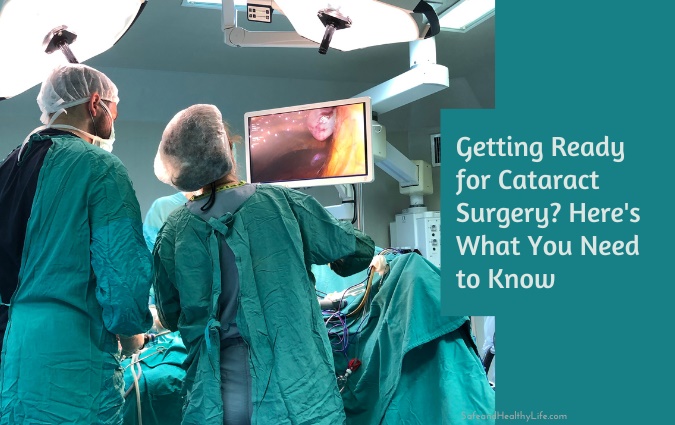
Cataracts can be a scary experience, and the thought of undergoing surgery to fix it can seem daunting. But with the right preparation, you can make sure that your cataract surgery is successful and safe.
This article will provide you with all the information you need to know about preparing for your cataract surgery, from knowing the symptoms and risk factors to making sure your home is ready for post-op recovery.
Know the Symptoms and Risk Factors for Cataracts
It’s important to be aware of the signs and symptoms of cataracts in order to identify them early on.
Symptoms of cataracts include blurred vision, difficulty seeing at night, glare sensitivity, double vision or multiple images in one eye, fading or yellowing of colors, as well as frequent changes in eyeglass prescriptions.
Risk factors include aging (most common), smoking (second most common), diabetes, high blood pressure, eye injury or trauma, and excessive UV exposure from sunlight.
Discuss Your Options with an Eye Care Professional
Talking with your eye care professional about cataract options is important for obtaining the best outcome for the procedure.
Many methods of cataract surgery may be discussed, such as Laser-assisted cataract surgery, which uses highly sophisticated technology to break up and remove the cloudy lens.
Different types of lenses are also available when replacing the cataract, depending on whether or not you choose refractive intraocular lenses. Your eye care professional can help you decide which option works best based on your unique needs.
Furthermore, they’ll provide information about pre-surgical preparation and post-surgical care to support a successful outcome.
Be sure to ask plenty of questions before scheduling your surgery; this will give both you and your eye doctor peace of mind when making an optimal decision.
Get a Comprehensive Eye Exam
Before having cataract surgery, it is wise to get a comprehensive eye exam to ensure all the necessary steps are being taken for a successful operation.
During this examination, the ophthalmologist will check your vision, perform tests on the front and back of your eye, examine drainage angles and intraocular pressure, take pictures of your eyes, calculate your lens power and evaluate if you have any other issues that can affect your outcome.
It is important to accurately report all medications, allergies, and history of many common health problems such as diabetes or high blood pressure during this examination so that the doctor can provide customized advice or treatment before proceeding with cataract surgery.
Learn About the Risks and Benefits of Surgery
It’s important that you understand all possible risks associated with cataract surgery before making any decisions about having it done.
Some potential complications include infection, increased intraocular pressure, retinal detachment, and corneal edema (swelling).
However, there are also numerous benefits associated with having a successful procedure including improved vision quality in both eyes and an overall improvement in day-to-day functionality thanks to better sight.
Make Sure You Have Adequate Insurance Coverage
Cataract surgery is considered elective by many insurance plans meaning that they won’t cover all costs associated with it – especially if they deem them unnecessary or too expensive when compared to alternative treatments like glasses or contact lenses.
That said, it’s important that you check with your insurance provider beforehand so that you know exactly what is covered under their policy when it comes time to pay out-of-pocket expenses related to this procedure.
What to do and not to do before surgery
It is important to take the necessary precautions before your cataract surgery. You should speak to your doctor and get preoperative instructions including which medications to avoid, any limitations on activity and diet, as well as other advice to ensure a successful outcome.
Do not eat or drink anything for at least 8 hours prior to surgery and be sure to wear something comfortable when you go in for the procedure.
You will also need someone to drive you home from the clinic, so it is advised that you arrange transportation beforehand.
Finally, it is important that you listen carefully to your doctor’s instructions pre-surgery and follow them exactly as they are prescribed.
This will help you stay healthy during recovery and minimize the risk of complications.
Prepare Your Home for Post-Op Recovery
As part of preparing for cataract surgery, it’s also important to make sure that your home environment is conducive to post-operative recovery.
This means stocking up ahead of time on items such as over-the-counter pain medications like ibuprofen or acetaminophen as well as cold compresses which can help reduce pain after surgery has been completed.
Additionally, you should ensure proper lighting around the house such as installing brighter bulbs in key places throughout living areas.
This will ensure that there are no dark spots where shadows could impair visibility while recovering from myopia treatments like laser corrective surgeries performed during a typical cataract operation.
About The Author:
I’m Robert Hernandez, a health blogger by profession and a fitness enthusiast by nature. I’ve been helping people maintain vigorous lifestyles through my writing.




